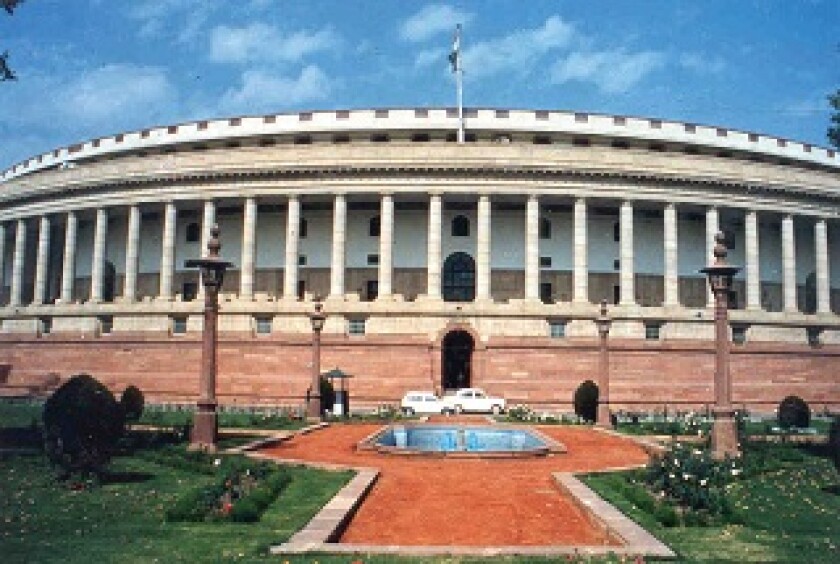|
|
The budget was well received, but the largest companies did not see their corporate tax rate cut |
In a budget that will play well with the electorate ahead of the 2019 elections, Finance Minister Arun Jaitley gave generously to some businesses, but left MNEs disappointed, and with a potentially higher tax burden.
Rakesh Nangia, managing partner of Nangia & Co, described the budget as "balanced, rational and optimistic".
His views were echoed by Seshagiri Rao, joint managing director and joint CFO at JSW Steel. In an ITR webinar on the day of the budget (which readers can listen back to at bit.ly/INDwebinar) he said: "From a macroeconomic point of view, this is a very good budget."
While the corporate tax rate was cut by five percentage points for 99% of companies, large multinationals will continue to pay India's 30% headline rate under proposals unveiled by Jaitley in his budget speech on February 1. Worse still, big businesses will have to contend with a new long-term capital gains tax on the sale of equity shares, but they will be protected against retrospective taxation through a grandfathering clause.
However, it is rules on permanent establishments (PEs) that multinationals will need to consider more carefully with the Finance Bill 2018 defining what a 'significant economic presence' means, and detailing what constitutes a digital PE in line with the BEPS project.
On indirect taxes, this was the first budget after the country's landmark goods and services tax (GST) regime was implemented. However, as a full year's revenue results are not yet available, Jaitley focused his proposals in this area on customs, announcing rate changes, incentives for the government's 'Make in India' initiative, and renaming the Central Board of Excise and Customs.
"Overall the budget seems to be a well-balanced populist budget as would have been expected in the year before elections," said Nishant Shah, partner at Economic Laws Practice. "It will be interesting however to see how the various schemes announced in the budget are effectively implemented. It will also be interesting to see how the finance minister is able to maintain the fiscal deficit at 3.3% as estimated by him for FY 2018-19."
Corporate tax rate disappointment for multinationals
Perhaps the biggest piece of corporate tax news in the budget was the decision to expand the application of the lower 25% corporate tax rate.
Last year, Jaitley announced that the rate would be lowered from 30% to 25% for companies with a yearly turnover of up to INR 500 million ($7.8 million). Many businesses were expecting a tax rate cut for all companies in this year's budget, but the finance minister instead announced that only companies with a turnover of less than INR 2.5 billion will be eligible for the lower rate.
While this will mean that the vast majority of companies operating in India will pay corporate tax at the lower rate, many multinationals will be stuck at the higher rate. Some will feel short-changed given that Prime Minister Narendra Modi's administration has previously signalled its intent, in Parliament, to reduce the standard rate from 30% to 25% in line with the global trend for falling corporate tax rates.
"This is a welcome move which shall put India in a competitive place in [a] limited way," said Nangia. "However the other 1% pays the maximum taxes and the global fall of taxes has not been mirrored."
Long-term capital gains tax
One of the stand-out measures in the budget was the re-introduction of a long-term capital gains (LTCG) tax. The LTCG tax has not been a part of the Indian tax base since 2004-2005, when it was abolished by P Chidambaram, who was finance minister at the time.
The new-look LTCG tax will be applicable at a rate of 10% on profits exceeding INR 100,000, meaning higher costs for businesses. However, all gains up to January 31 2018 will benefit from a grandfathering clause to ensure there is no retroactive taxation of capital gains, subject to eligibility.
Jaitley estimates that this proposal, which aims to level the playing field across growth oriented funds and dividend distributing funds, will generate marginal revenue gains of about INR 200 billion in the first year, and more in subsequent years.
"On the tax proposals, the finance minister has attempted to play a balancing role by on the one hand granting/expanding deductions from taxable incomes, whereas on the other hand bringing back a long term capital gains on sale of securities as well as increasing the surcharge for specified categories of tax," said Shah.
Nangia believes that with the markets being at an all-time high, the grandfathering of the gains that people have been sitting has "taken the sting out of the levy which would otherwise have resulted in retrospective taxation".
While investors will not be pleased with the new tax, the grandfathering avoids giving them a nasty shock should at least convince them that India intends to continue to provide regulatory certainty.
BEPS and having a 'significant economic presence'
There were a few changes in the Finance Bill to bring India's tax legislation in line with best practices mandated by the BEPS project, as well as measures widening the scope of a 'business connection' under domestic law, which has a wider treaty impact.
A provision in Chapter III of the Finance Bill proposes to amend the Income-tax Act, 1961 to insert an explanation on the 'significant economic presence' of a non-resident in India and what this term means. It also explains what constitutes a 'business connection' of the non-resident in India for treaty purposes.
The proposed digital PE concept is aimed at taxing new business models operating remotely through the digital medium, relying on one of the options under the BEPS Action Plan 1 of the nexus rule based on a 'significant economic presence'.
The draft laws says that a "significant economic presence" will refer to:
a) any transaction in respect of any goods, services or property carried out by a non-resident in India including provision of download of data or software in India, if the aggregate of payments arising from such transaction or transactions during the previous year exceeds such amount as may be prescribed; or
b) a systematic and continuous soliciting of its business activities or engaging in interaction with such number of users as may be prescribed, in India through digital means.
Moreover, the provision will mean that transactions or activities shall constitute significant economic presence in India, whether or not the non-resident has a residence or place of business in India or renders services in India. However, only income attributable to the transactions or activities referred to in clause (a) or clause (b) shall be deemed to accrue or arise in India.
If approved, the clause will take effect from April 1 2019 and will apply from assessment year 2019-2020.
However, Samir Gandhi, partner at Deloitte Haskins & Sells, notes that unless corresponding modifications to the PE rules are made in the India tax treaties, the proposed changes cannot be applied, but it will enable India to negotiate on including a nexus rule in its tax treaties going forward. "One has also to study the interplay of the equalisation levy introduced by India earlier with the proposed amendment," he said.
In addition, the Finance Bill proposes to widen the scope of a 'business connection', which would allow India to align its laws with the position taken in tax treaties following the signing of the Multilateral Convention to Implement Tax Treaty Related Measures (the MLI).
The provision states that a non-resident's 'business connection' in India includes any business activities carried through a person who, acting on behalf of the non-resident, habitually concludes contracts or habitually plays the principal role leading to conclusion of contracts by the non-resident.
Gandhi said companies will need to examine the functions performed by the Indian taxpayers acting as commission/indenting agents on behalf of the foreign principals to test the existence of a PE. "In the event a PE exists – which would be the case under the expanded definition – it would be important to work out the attribution of profits applying transfer pricing principles. In appropriate cases the existing business models may be required to be reviewed and modified," he said.
|
|
This is the last budget before India heads to the polls in 2019 |
Other measures
Aside from the tax proposals that will require analysis by in-house tax teams, Jaitley announced a host of additional measures on customs and other matters.
These included increasing the customs duty on mobile phones from 15% to 20%, and on various accessories and parts to 15%. Some television parts also had their customs duty increased to 15%
The government also announced that the e-assessment pilot in 2016 and 2017 will be rolled out across the country, reducing the interface between the tax department and taxpayers. Jaitley said this will "transform the age-old assessment procedure of the income tax department and the manner in which they interact with taxpayers and other stakeholders".
To further eliminate the person-to-person contact, and boost efficiency and transparency, the finance minister proposed introducing a new scheme for assessment where the assessment will be done in electronic mode.
Although the budget didn't offer many treats for multinationals, the balanced approach taken by Jaitley gives many businesses the stability they desire as the political parties gear up for the 2019 elections. The question ahead of the elections is how the new clauses on a 'significant economic presence' and a 'business connection' are interpreted.














